- 606-889-173
- [email protected]
- Czech Republic

Present Perfect
For recently finished actions.

Table of Contents
In this grammar section we will have a look at the tense Present Perfect to talk about recently finished/completed actions.
A: How long have you worked there? B: I have worked there for 3 years.
A: How long have you been friends? B: We haven’t been friends for long. We have been friends since 2022
The video gives an overview of to Present Perfect for something recently completed/finished actions.
It shows the meaning/usage: when and why to use the Present Perfect.
For the form and the pronunciation have a look a the different webpages:
- Present perfect form
- Present perfect pronunciation
Usage/ Meaning
How and when do we use the Present Perfect?
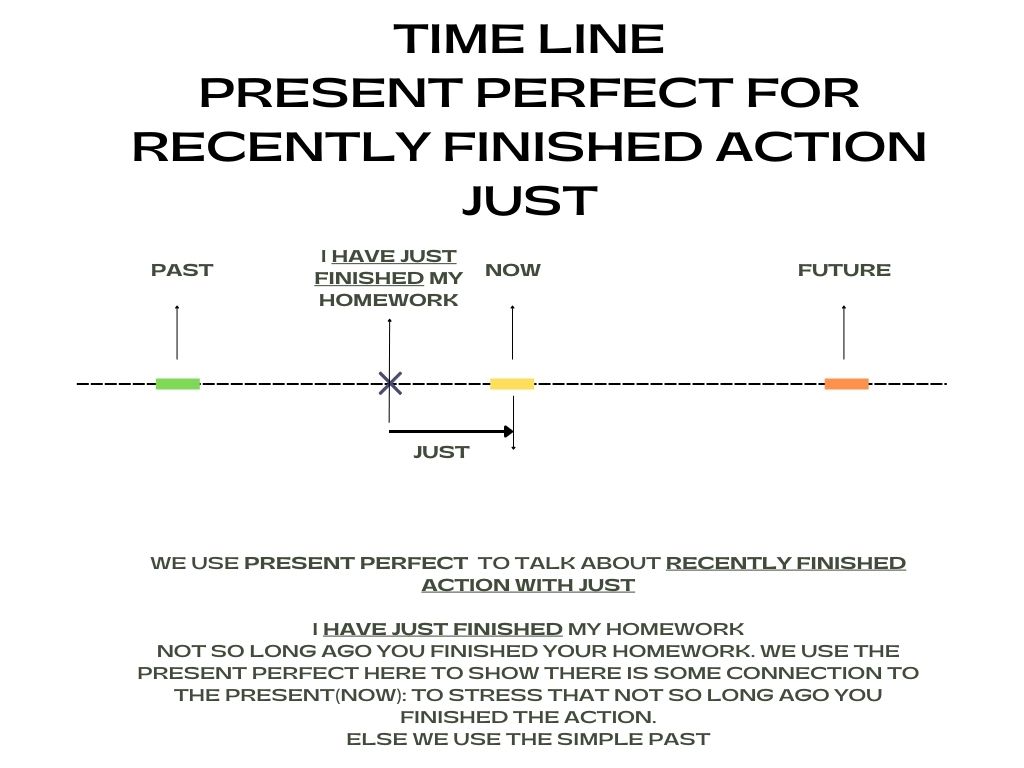
Present Perfect is also used to talk about something recently finished.
I have just done my homework: This means not so long ago you finished your homework . It is an unspecified time in the past . We don’t know when the person did it, but it wasn’t so long ago . It is usually used to stress that you finished the action and there it no need to do it anymore or no need to worry about it anymore .
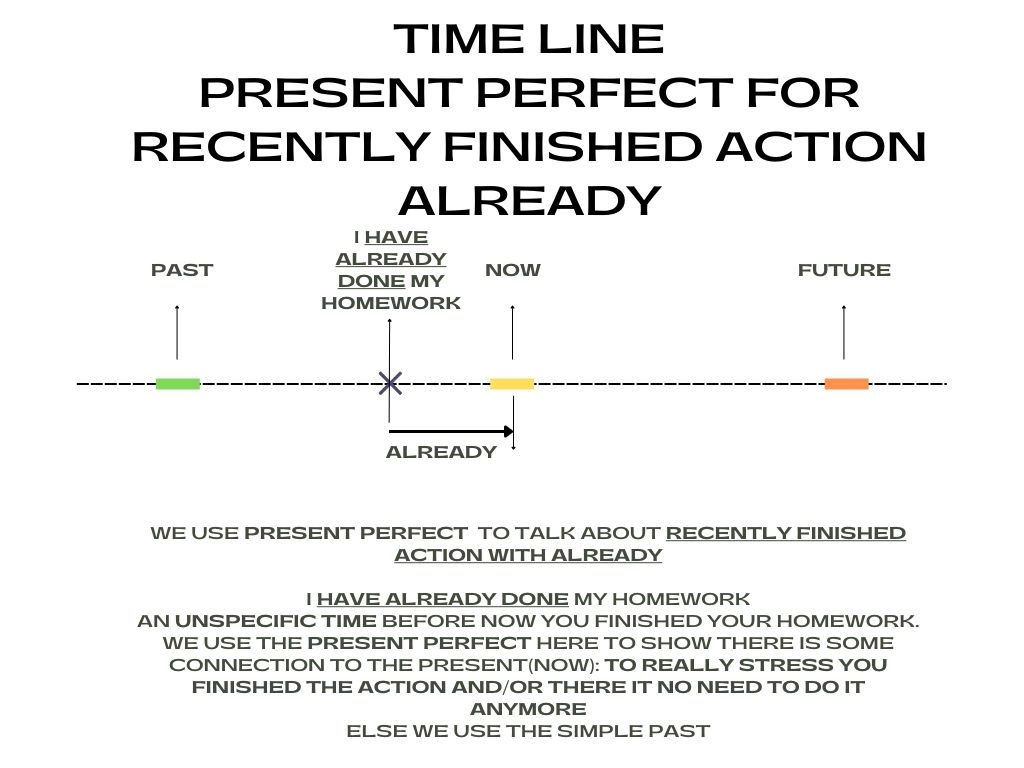
I have already done my homework: This means you finished your homework somewhere before now . It is an unspecified time in the past . We don’t know when the person did it . It is usually used to stress that you finished the action and there it no need to do it anymore or no need to worry about it anymore .
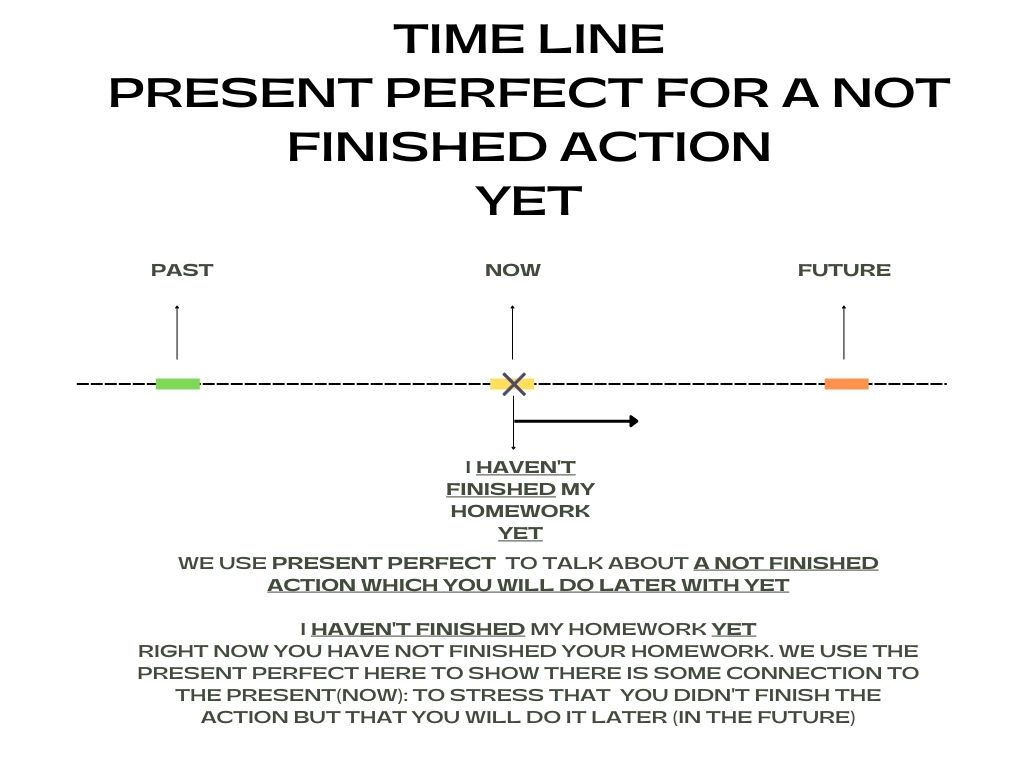
Present Perfect is also used to talk about something that is not finished.
I haven’t done my homework yet : This means you did not finished your homework somewhere before now but that you will do it later . It is usually used to stress that you did not finished the action but you will do it somewhere soon in the future.
|
|
| |
|
|
| |
|
| ||
|
|
|
|
- Just: recently finished actions. positive and questions. Between have and the main verb : I have just finished .
- Already: finished actions. positive and questions. Between have and the main verb : I have already finished .
- Yet: not finished, but will finish it later. Negative and questions. At the end of the sentence: I haven’t finished yet .

Have a look at the questions and write your answers in the comments below . Also give us some more details about when, where, why,….
- What have you already done today?
- What haven’t you done yet today, but must still do today?
- What have you just finished before answering these questions?
- Have you just had some food?
- Have you already finished your homework?
- Have you already studied today?
- Have you just had a phone call?
- Have you already had lunch today?
- Which movie have you already seen more than 2 times?
- Which goals in your life have you already achieved?
Spread the word
Kristof Abrath Teacher, Trainer, Course Designer Teaching in English on 4 different continents since 2006.
More tenses
English courses, additional services.

Grammar Bootcamp Tenses Level 2
€ 99,95

Cambridge Advanced CAE Full Writing correction
€ 24,99
Cambridge Advanced CAE Basic Writing correction
€ 14,99

Cambridge First FCE Full Writing correction
Cambridge first fce basic writing correction.

Phrasal Verb Course 1
€ 11,00
Comments or Questions?
Leave a reply cancel reply.
Your email address will not be published. Required fields are marked *
This site uses Akismet to reduce spam. Learn how your comment data is processed .
Kristof.abrath.com is registered under Kristof Abrath IČO: 07420609
- Job interview preparation
- Business English
- Business Communication
- Business Writing
- English Speaking
- English Writing
- English Grammar
- English Vocabulary
- Private English Course
- Teacher Training
- Teacher Training Workshops
- What we offer
Welcome Back
Login to your account.

How to use the 'Present Perfect'

'I have been to Boston.'
Have/has + past participle makes the present perfect .
She has lost her bag. They have taken a taxi I have been to Australia
The present perfect tense is used to describe something that happened in the past, but the exact time it happened is not important. It has a relationship with the present.
I have done my homework = I finished my homework in the past. It is not important at what exact time, only that it is now done. I have forgotten my bag. = Exactly when in the past that I forgot it is not important. The important thing is that I don't have it now .
As we do not use exact time expressions with the past perfect, we cannot say: I have done my homework yesterday
In this case we use the past simple tense: I did my homework yesterday.
Using already just and yet with the present perfect
Already , just and yet can are all used with the present perfect.
Already means 'something has happened sooner than we expected: 'The movie only came out yesterday, but I have already seen it.'
Just means 'a short time ago': 'I have just seen your brother going into the bank with a gun!'
Yet is only used in questions and negative sentences. It means 'something is expected to happen': 'Have you finished the report yet?' No, I haven't finished it yet.'
Now choose the best answer to make the present perfect:
- My parents ___. has retired have retired retired yet
- Your sister ___ my car. has borrowed has borrow have borrowed
- Have you ___ the movie yet? looked seen have seen
- Please wait. I haven't finished ___. just yet already
- Water __ found on Mars. has be have has been
- I have ___ all my money. has spend spent spend
- They ___ you a cake. have make have maded have made

- Lesson Index

English language Schools
Present perfect with a specific time in the past

The present perfect expresses the idea of “an action that was finished at some unspecified point in the past”. Saying “I have done it yesterday” is basically the same as saying “I finished doing it yesterday at some unspecified point in the past”. It doesn’t really work, does it; it’s either “at some point” or “yesterday”, not both. If you want to include the time when the action took place, you must use the simple past tense (the “-ed” form), e.g.
However, the simple past is ambiguous. “I did it yesterday” can be used to express that you finished it yesterday as well as that you left the work unfinished and will continue doing it later, as in “I did it yesterday, and I am also going to do it tomorrow”. If you want to express that the action is already completed, you can use verbs like “finish” or “complete” in the simple past:
Note that there is one case where “when + present perfect” can be used: to express surprise or mistrust. Say, a friend of yours told you how he enjoyed the view from the Eiffel Tower, and you weren’t aware of the fact that he had ever been to Paris. You could ask
It is an expression of surprise. You aren’t really asking when he visited Paris; you express that the fact he did surprised you.
There is another common situation in which the rule can be (seemingly) broken. For example, it is perfectly fine to say:
By the way, have you already seen my brand new web app for non-native speakers of English ? It's based on reading texts and learning by having all meanings, pronunciations, grammar forms etc. easily accessible. It looks like this:

Use the image
Sentence examples for i have done my homework from inspiring English sources
Login and get your AI feedback from Ludwig. Login and get your AI feedback from Ludwig.
Is your sentence correct in English?
Login and get your AI feedback from Ludwig.
Instead, I have done my homework and research, and have found that, without a doubt, Hillary Clinton has a flawless and impeccable background.
This instrument measures the child's perception of parental control by items such as "My mother wants to know if I have done my homework " and "My mother wants to know with whom I hang around".
Example: " I have done my homework ," He hecho mi tarea.
"But now I 've done my homework .
" I 've done my homework on this.
"I thought I had done my homework ," Grace told him.
I had done my homework and thought it all out, or so I thought.
Write in English at your best, with Ludwig
Used by millions of students, scientific researchers, professional translators and editors from all over the world.

Simone Ivan Conte
Be a smart writer
Most frequent sentences:, write in english at your best with ludwig.

Had Done vs. Have Done – What’s the Difference? (+Examples)
Have you ever had difficulties making sense of past tenses and how to use them? For example, what’s the difference between “Had Done” and “Have Done”? We want to know when each of the forms should be used and what exactly they mean in a sentence.
Let’s find out.
Had Done vs. Have Done – What’s the Difference?
Both “Had Done” and “Have Done” express actions that happened in the past. “Have Done” is the present perfect tense, and indicates an action was just finished or finished in the recent past. “Had Done” is the past perfect tense, and expresses an action taken before another action.
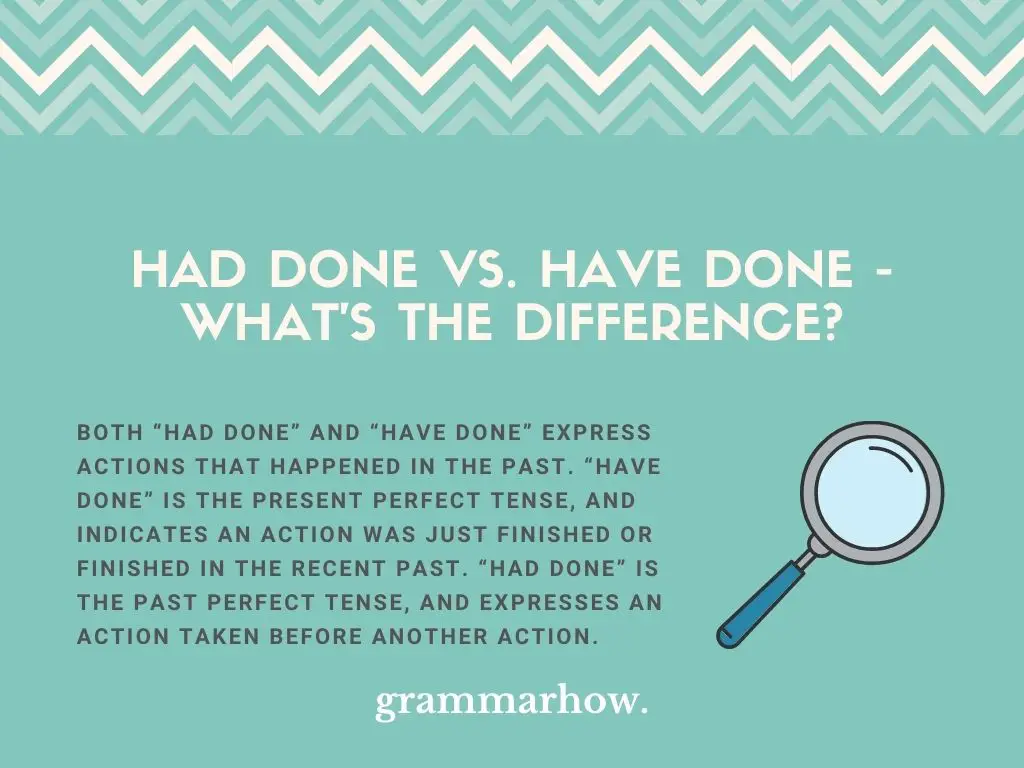
Believe me when I tell you it’s less complicated than it sounds. Let’s start by looking at some examples:
- I have done the dishes.
- I had just done the dishes when Howard approached me.
The first sentence indicates the dishes are done. In fact, the present perfect form expresses that the dishes were done recently and possibly the action just finished. In this context, the correct form is “Have Done”.
The second sentence indicates that the dishes were done before Howard approached the subject. In other others, a second action (the approach) took place after the first action (doing the dishes) happened.
In that scenario, the correct form to use is the past perfect, and the correct form is “Had Done”.
“Had Done” is the past perfect of the verb “Do”. It should be used to indicate that an action had been fished before a second action took place. The idea, simply put, is to express that action A was finished before action B happened.
To make better sense of how this works, let’s go over some examples of sentences that use the form “Had Done”:
- I had done the cleaning before I went to work.
- He had done the laundry before Anna, so she could take as much time as she needed.
- We had already done the organizing before the boss told us to.
- Liz had done her work and submitted it before it was due.
- Even before you reminded me, I had done the grocery shopping already.
“Had Done” will always make it clear that the action it is describing took place before another action in the past took place. The order in the sentence might be inverted (like in sentence 5) but the timeline is expresses will always remain clear.
If you’re talking about only one action, you should use the form “Have Done”.
“Have Done” is a bit simpler than “Had Done”, because it can express one stand-alone action, without the need to think about what happened before or after. “Have Done” is the present perfect of the verb “Do” and should be used to indicate an action was just recently finished.
Take a look at the sentences in the examples, that use the form “Have Done”:
- I have done all my homework.
- John has done all his work for the week.
- Luana has done the dishes, so I didn’t have to.
- The janitors have done all the cleaning this morning, in case you haven’t noticed.
- I asked Jose about the report, and he told me he has done it already.
Which Is Used the Most?
Which one of those forms is used more often, “Have Done” or “Had Done”? Take a look at the graph from Google Ngram Viewer below.
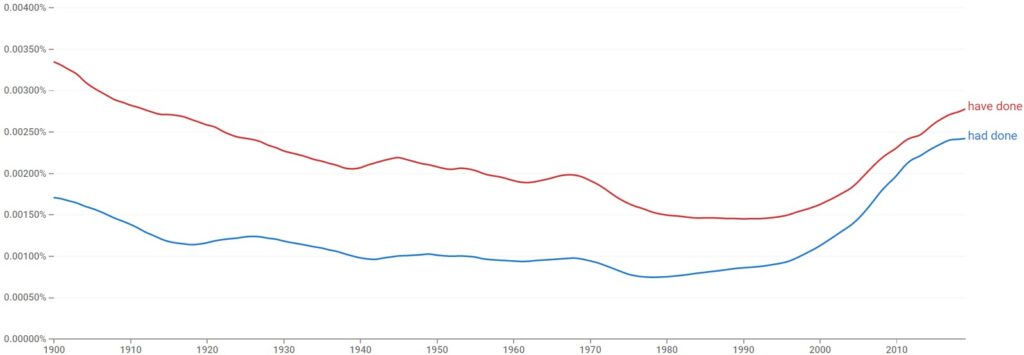
“Have Done” is used more than “Had Done”, but just by a slim difference. It was actually interesting to see, in the graph, that both expressions follow the exact same trends over the years: when one goes up, the other follows, and vice versa.
As of now, both seem to be used almost at the same frequency. We think this makes sense, because “Have Done” and “Had Done” indicate different past tenses and, consequently, tell different stories.
Final Thoughts
Both “Have Done” and “Had done” are grammatically correct. Use “Have Done”, the present perfect tense, to describe actions that just took place and are recently finished. Use “Had Done” to describe an action finished in the past, that took place before another action that happened afterward.

Martin holds a Master’s degree in Finance and International Business. He has six years of experience in professional communication with clients, executives, and colleagues. Furthermore, he has teaching experience from Aarhus University. Martin has been featured as an expert in communication and teaching on Forbes and Shopify. Read more about Martin here .
- 10 Ways to Say You’ve Finished Your Master’s Degree Studies
- “What Have You Done” vs. “What Did You Do”
- “Needs To Be Done” vs. “Needed To Be Done” – Difference Explained
- “I Sent” vs “I Have Sent” vs “I Had Sent” An Email (Complete Guide)

CEFR text analysis tool
After + having | being + PAST PARTICIPLE
Let’s explain some examples of the grammar structure: ‘ after being pp ‘ and ‘ after having pp ‘:
- After being told these stories , I started thinking. ( psychic-experiences.com)
- I moved back to India after having spent six years in the US. (indix.com )
- Firstly, ‘ after’ is a preposition before a complement ‘verb-ing’ clause. For example, ‘ after the story’ , ‘ after the U.S. ‘
- We can write ‘after being told…’ in another way with the same meaning: ‘ After I was told…’
- Here ‘ being ‘ is non-finite, which means: it does not have the meaning of time. ‘ I was told ‘ is the past simple passive’ .
- We could start sentence 1 in an active way too: After somebody told me … (but the person that said something is not important)
- ‘I started thinking’ is the main clause and it happened second in time. ( being told happened first in time)
- We change the order of the clauses: I started thinking after being told … You can see sentence 2 has ‘ after ‘ in the middle.
- We can write ‘ after having spent… ‘ in another with the same meaning: ‘ After I had spent’ = past perfect simple.
- First, they lived in the US and second, they moved to India.
In conclusion, ‘being’ replaces some tense/time structure with ‘ BE ‘ and ‘ HAVING’ replaces some tense/time structure that uses a form of ‘ HAVE ‘.
In the English Grammar Profile, B2 point 92 in the category of CLAUSES/ subordinated is defined as:
a non-finite subordinate clause with ‘after’ + ‘having/being’ + ‘-ed’ form, before a main clause, to refer to past time.
Note that there are two grammar points at the C2 level for having + been + past participle . And at B1 students can already use ‘before|after + VERB-ing’
After being…
A bruise is a dark mark you get after being hit.
Definition example from englishclass101
4 DIAGNOSED
6 AFTER BEING SHOT

This is obviously a dark topic. Further search for collocates make it even more related to gun injuries:
1 TIMES, 2 DIED, 3 HEAD, 4 HOSPITAL, 6 DURING, 7 DOWN, 8 POLICE, 9 CONDITION, 10 MULTIPLE
After being +
7 RELEASED, 8 CONVICTED, 9 NAMED, 10 ARRESTED, 11 STRUCK, 12 CAUGHT, 13 GIVEN, 14 TAKEN, 15 ACCUSED, 16 CHARGED, 17 EXPOSED, 18 ASKED
19 AFTER HAVING SPENT

2 LAST, 3 MONTHS, 4 HOURS, 5 WEEKS, 6 FEW, 7 DAYS, 8 SEVERAL, 9 PREVIOUS, 10 NIGHT
For results 20-50 we used AI to complete our sentences:
After being selected for the team, I trained hard every day. After being forced to work overtime, I decided to quit my job. After being drafted into the army, he served his country for two years. After having had a long and successful career, he retired. After being introduced to my new colleagues, I was given a tour of the office. After being left alone in the house, I got scared. After being sent to the hospital, he was treated for his injuries. After being held captive for several months, she was finally released. After being called to the principal’s office, I was disciplined for my behavior. After being put on probation, he had to follow a strict set of rules. After having done my homework, I watched TV. After being used for many years, the car was finally replaced. After being fired from his job, he had to find a new way to make a living. After being born in a small village, he moved to the city to find a better life. After being placed in foster care, she was finally adopted by a loving family. After being elected president, he promised to make the country a better place. After being inspired by her story, I decided to start my own business. After being rescued from the burning building, he was taken to the hospital. After having seen the movie, I wrote a review of it. After being injured in the accident, he was unable to walk for several weeks. After having worked hard all day, I was exhausted. After being pulled over by the police, he was given a ticket. After being bitten by a dog, she went to the doctor to get a rabies shot. After having served his country for many years, he retired from the military. After being admitted to the hospital, she was given surgery. After being picked last for the team, he proved everyone wrong by becoming the best player. After being dropped from the team, he was devastated. After having received a scholarship, she was able to attend her dream college.
1 AFTER HAVING BEEN
( C2 grammar non-finite ‘-ing’ perfect forms of the passive as the complement of prepositions.)
further collocates to the right:
*Final note, it isn’t always clear whether ‘-ed past participles’ should be considered adjectives:
STUDENT IN SPEAKING TEST EXAMPLE:
After being involved in over a hundred and sixty tests and three hundred and seventy-one Internationals,
Ponting is Australia’s leading run-scorer in both formats of the game.
TLC female Sri Lanka B1
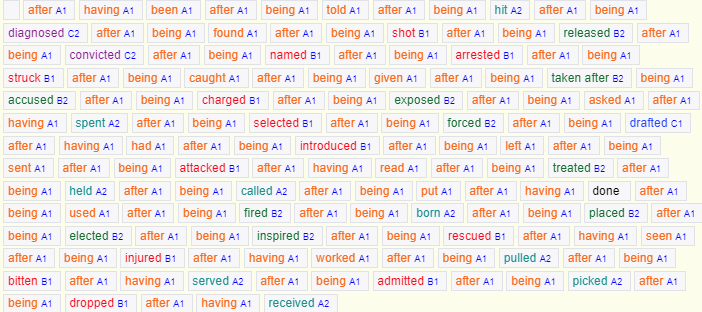
The most common verbs ranked in the iWeb corpus have been added in order to our quiz:

#1. At this stage of his career, after being ************ repeatedly about what he needs to change or do to get better and get more recognition, it's clearly on him and him alone to make it happen. ? what's the missing verb?
After 9yrs in the NBA, JSmith is still struggling with the same issues of emotional and psychological immaturity and poor decision making. Otherwise, he’s solid as a rock. At this stage of his career, after being told repeatedly about what he needs to change or do to get better and get more recognition, it’s clearly on him and him alone to make it happen.
| Source | |
| Date | 2012 |
| Title | Atlanta Hawks: Lesson to be learned in technical fouls | Atlanta Hawks |
after been or after being?
‘After been’ is wrong. Here is a search in iWeb corpus for the frequency of both:
- 1 AFTER BEING 227,580 examples in the corpus 2 AFTER BEEN 610 errors
Choose ‘After I had been…’ or ‘After being…’
2 thoughts on “After + having | being + PAST PARTICIPLE”
Good night my dear teacher actually I want to join the online class please accept me
Hi, have we met before? What kind of online class were you thinking of?
Leave a Comment
Your email address will not be published. Required fields are marked *
- PRO Courses Guides New Tech Help Pro Expert Videos About wikiHow Pro Upgrade Sign In
- EDIT Edit this Article
- EXPLORE Tech Help Pro About Us Random Article Quizzes Request a New Article Community Dashboard This Or That Game Happiness Hub Popular Categories Arts and Entertainment Artwork Books Movies Computers and Electronics Computers Phone Skills Technology Hacks Health Men's Health Mental Health Women's Health Relationships Dating Love Relationship Issues Hobbies and Crafts Crafts Drawing Games Education & Communication Communication Skills Personal Development Studying Personal Care and Style Fashion Hair Care Personal Hygiene Youth Personal Care School Stuff Dating All Categories Arts and Entertainment Finance and Business Home and Garden Relationship Quizzes Cars & Other Vehicles Food and Entertaining Personal Care and Style Sports and Fitness Computers and Electronics Health Pets and Animals Travel Education & Communication Hobbies and Crafts Philosophy and Religion Work World Family Life Holidays and Traditions Relationships Youth
- Browse Articles
- Learn Something New
- Quizzes Hot
- Happiness Hub
- This Or That Game
- Train Your Brain
- Explore More
- Support wikiHow
- About wikiHow
- Log in / Sign up
- Education and Communications
- Study Skills
- Homework Skills
How to Finish Your Homework
Last Updated: July 11, 2024 Fact Checked
This article was co-authored by Emily Listmann, MA . Emily Listmann is a Private Tutor and Life Coach in Santa Cruz, California. In 2018, she founded Mindful & Well, a natural healing and wellness coaching service. She has worked as a Social Studies Teacher, Curriculum Coordinator, and an SAT Prep Teacher. She received her MA in Education from the Stanford Graduate School of Education in 2014. Emily also received her Wellness Coach Certificate from Cornell University and completed the Mindfulness Training by Mindful Schools. There are 16 references cited in this article, which can be found at the bottom of the page. This article has been fact-checked, ensuring the accuracy of any cited facts and confirming the authority of its sources. This article has been viewed 283,133 times.
While studying can differ for different age groups, many of the things that get in the way are the same. Whether it's your environment or time management skills, it easy for things to discourage you from finishing your homework. With a little organization and help, your homework can become approachable.
Managing Your Time

- For instance, try setting aside a time you know you can work well such as an hour or 2 before dinner, or if you're a night owl, after dinner.

- Work in hour blocks, with 50 minutes spent studying and 10 minutes spent taking a break.
- It can also be helpful to move around when you are taking your break, especially if you are working at a screen. Go for a walk outside to get your blood circulating and enjoy some fresh air.
- You might also want to eat a healthy snack on your break to improve your focus. Avoid junk food and choose something like a handful of nuts, a piece of fruit, veggies, or a small portion of cottage cheese.

- Identify which assignments are worth the most points for each class. Most likely these will take the longest to complete. [5] X Research source
- Consider how long you have to do each project, and if possible, see when the assignment is introduced. Oftentimes, primary and secondary school classes do not have syllabi, so it might be harder to plan out an entire term, but if you are in college, you will most likely have a syllabus with at least a partial course schedule. Knowing how long you have to complete an assignment will help you prioritize which assignments to do first. You can also ask the teacher how long you have to complete an assignment. [6] X Research source

- Use highlighters or stickers to mark which assignments are most important.
- If you're using an online or mobile schedule, create alerts or notifications for the projects and any time-sensitive steps for those projects.

- Don't let a big project overshadow the smaller assignments you need to complete!

- Assignment outlines can help you visualize the necessary tasks to get the assignment done.

Creating a Productive Work Environment

- A desk or table would be a better location than a couch or a bed.

- Turn your phone off or on silent (not vibrate). It might be best to put the phone out of sight, or in another room while you work, as the temptation to text or get on social media can be as much of a distraction as actually using social media.
- Use an app that blocks social media. There are plenty of applications out there that can help block social media and other distracting sites (such as shopping or gaming sites). [10] X Trustworthy Source Pew Research Center Nonpartisan thinktank conducting research and providing information on public opinion, demographic trends, and social trends Go to source

- Use a white noise app to block out noise.
- Use earplugs or noise-blocking earmuffs. [12] X Research source
- Work in a quiet place, such as a library or a home office, if you have one.
- Avoid listening to music while studying. Studies have shown that although listening to music while studying lowers overall performance, this does not affect everyone equally. [13] X Research source However listening to music before studying has been shown to improve performance on cognitive tasks. [14] X Research source

Using Your Resources

- If you're too afraid to ask a teacher during class, see if you can stay behind to ask your questions.

- First, contact your school to see if there are any after-school tutoring programs. While not all primary and secondary schools offer tutoring, a vast majority of universities do. If your school does not offer tutoring, they may know of other resources for you to contact.
- Then, contact your library to see if they offer any tutoring. [18] X Research source
- In some areas, there may also be free community tutoring programs. Contact your local community center for more information.
- There are plenty of private tutors out there as well, but they can be costly (ranging from $20 to $100 an hour). [19] X Research source You can find tutors online through a number of websites, such as Craigslist or Angie's list.

- If you need to work at a library after school, ask your parents or search the web to find your local library.
Supercharge Your Studying with this Expert Series

Community Q&A
Reader Videos
- Don't feel too stressed or you'll be doing less work than you actually can. Thanks Helpful 7 Not Helpful 3
- Make sure you’re getting enough sleep. Thanks Helpful 5 Not Helpful 3
- Maintain a healthy diet. Thanks Helpful 5 Not Helpful 3

- Recommended time doing homework varies by age. The National PTA recommends about 10 minutes per grade level per night (30 minutes a night for the third grade). Thanks Helpful 9 Not Helpful 0
- Some people may need additional help in order to focus on their homework and finish it. If you are struggling in school, ask your parents or teachers about what resources may be available, and seek out professional help or ask your parents to do so, if necessary. Thanks Helpful 29 Not Helpful 9
- If you are under the age of thirteen, you may need to obtain your parents’ permission before downloading any computer applications. Thanks Helpful 30 Not Helpful 13
You Might Also Like

- ↑ https://kidshealth.org/en/teens/homework.html
- ↑ https://www.takingcharge.csh.umn.edu/power-habit-charles-duhigg
- ↑ https://www.edutopia.org/article/research-tested-benefits-breaks/
- ↑ https://www.wma.us/about/titan-blog/post/~board/titan-blog/post/how-to-prioritize-school-assignments-and-homework
- ↑ https://jhsap.org/self_help_resources/school-life_balance//
- ↑ https://lsc.cornell.edu/how-to-study/studying-for-and-taking-exams/guidelines-for-creating-a-study-schedule/
- ↑ https://success.oregonstate.edu/learning/concentration
- ↑ https://www.pewresearch.org/internet/2020/07/28/parenting-children-in-the-age-of-screens/
- ↑ https://kidshealth.org/en/teens/homework.html/
- ↑ https://absn.northeastern.edu/blog/8-things-to-keep-in-your-at-home-study-space/
- ↑ https://scholar.utc.edu/theses/171/
- ↑ https://onlinelibrary.wiley.com/doi/abs/10.1002/acp.1731
- ↑ https://kidshealth.org/en/teens/talk-to-parents.html
- ↑ https://rdw.rowan.edu/cgi/viewcontent.cgi?article=2412&context=etd
- ↑ https://blogs.chapman.edu/scst/2016/02/09/what-tutoring-is-and-what-tutoring-is-not/
- ↑ https://undergrad.stanford.edu/tutoring-support
About This Article

- Send fan mail to authors
Reader Success Stories
Darrell Rivers
Oct 16, 2021
Did this article help you?
Sep 13, 2021
Rowan Kennedy
Sep 9, 2016
Oct 19, 2021
Oct 9, 2021

Featured Articles

Trending Articles


Watch Articles

- Terms of Use
- Privacy Policy
- Do Not Sell or Share My Info
- Not Selling Info
Get all the best how-tos!
Sign up for wikiHow's weekly email newsletter
Do – Does – Did – Done
DO – DOES – DID – DONE
The word DO appears a lot in English.
This is because it can be a verb, as in the verb TO DO which can be conjugated as Do and Does in the present tense, Did in the past tense and Done as a past participle.
DO can also be an AUXILIARY verb in the form of Do / Does to make questions in the present tense and Did to make questions in the past tense.
Let’s look at each one in more detail. We will start with the verb TO DO.
As we have seen, the verb TO DO has four forms: Do / Does / Did and Done Lets look at its form in the simple present tense.
TO DO – Present Tense
With the verb TO DO in the Present Tense… We say: I do / you do / we do / they do But we say: he does / she does / it does
Let’s look at some example sentences:
- I do my laundry on Saturdays.
(Do my laundry means I wash my clothes, well, I put in the washing machine)
- They do their chores when they arrive home.
(Chores is the housework you need to do like washing the dishes, doing the vacuuming, etc.)
- He does nothing all day. (That’s right… he is quite lazy, he does absolutely nothing.)
- She does charity work when she has time. (People that do charity work are superheroes)
TO DO – Past Tense
The simple past tense of DO is DID for all subjects: I did / you did / we did / they did / he did / she did / it did Notice how there is only one form of the verb in the past tense…. DID .
- He did a magic trick. (Yes, and everyone was amazed… wooow!)
- The baby did a fart. (Yes, and the smell made everyone cry. How can such a cute thing produce something so rotten.)
- I did my homework in record time. (Yes, it only took me 5 hours instead of 10)
- She did ballet after school last year. (This year she is doing something different)
TO DO – Past Participle
The past participle of DO is DONE . Remember that past participles are accompanied by a conjugation of the verb TO HAVE or TO BE (which means it is in the correct tense according to the subject)
In general Have + past participle is used with a perfect tense and BE + past participle is with the passive voice . Let’s look at some examples:
- I have done my homework.
- He has done a good job.
These two sentences are in the present perfect tense because they have have or has before the past participle done .
- The video will show you how it is done .
- The report was done on time.
Here we used a conjugation of the verb To Be before the past participle done .
TO DO – To replace a verb
We sometimes use the verb DO to replace a verb when the meaning is clear or obvious. This replacement is more common in informal spoken English:
- Have you done the dishes yet?
(Here done means washed )
- I’ll do the kitchen if you do the lawns
(The first do means clean – The second do means mow )
Sometimes Do , Does , and Did are used as auxiliaries to make questions in English.
Let’s start with DO and DOES:
DO / DOES – For Questions
To make a question in the simple present tense in English we normally put the auxiliary Do or Does at the beginning of the question before the subject. After the subject is the verb in its base form which means the infinitive without TO at the beginning. Look at this affirmative sentence:
- You speak English.
How can we make this a question? We add DO at the beginning so it becomes:
- Do you speak English?
You will see that we add DO at the beginning when the subject is I , you , we or they .
But look at this affirmative sentence:
- He speaks Arabic.
To make this a question we say:
- Does he speak Arabic?
You can see that we add DOES at the beginning when the subject is he , she or it .
Notice how the letter S at the end of the verb in the affirmative sentence (because it is in third person) disappears in the question. That is because the verb is in the base form of the infinitive.
NOTE: We DON’T use Do or Does in questions that have the verb To Be or Modal Verbs (can, must, might, should etc.)
DID – For Questions
Let’s look at the auxiliary DID.
To make a question in the Simple Past Tense in English we normally put the auxiliary DID at the beginning of the question before the subject. And just like in the present tense, After the subject is the verb in its base form which means the infinitive with TO at the beginning. Look at this affirmative sentence:
- You lived in Spain.
How can we make this a question? We add DID at the beginning so it becomes:
- Did you live in Spain?
We use the verb form Live and NOT lived because the auxiliary DID show that the question is in the past tense.
Did is also used with He, She and It. So with this affirmative sentence:
- She lived in Japan.
To make it a question in the past tense we say:
- Did she live in Japan?
Again we use DID for questions in the past EXCEPT with To Be and Modal Verbs such as Can . Compare these questions:
- Do you speak English?
- Did you speak English?
The only difference between a question in the present tense and the past tense is the first part… DO or DID. And look at these two questions
- Does he speak Italian?
- Did he speak Italian?
The only difference between a question in the present tense and the past tense when it refers to third person (he, she, or it) is the first part… DOES or DID.
Auxiliary and Verb together
Look at this question:
- Do you do exercises every day?
Why are there two DOs in this question? The first DO is necessary because we are making a question in the simple present tense. The second DO is from the verb TO DO. You DO exercises.
What happens if instead of YOU we are asking about another person?
- Does she do exercises every day?
We use DOES because it is necessary for simple present tense questions for third person, in this case for SHE. Does she….? Again DO appears because you DO exercises. It appears as DO and not DOES because the verb needs to be in the base form of the infinitive.
Of course in the past tense you would say:
- Did you do exercises yesterday?
Did is an auxiliary which is needed to make a question. Do is from the verb To Do.
DO and DOES – For Emphasis
Sometimes Do / Does / Did are used in positive sentences to give special emphasis that what you say is true, despite what the other person thinks. Note that when speaking, the word ( do/does/did ) is stressed.
- I do want to go. (We put stress on the word DO to emphasize that we really want to go, even if you think it is not true.)
- I did study for the test. (Contrary to what you may believe… yes, I studied)
Notice that Did is used for positive sentences in the past tense and that the main verb is in its base form.
- Yes, he does like broccoli. (You may be surprised but yes, he likes broccoli)
- You do need tickets for the event. (I am emphasizing that fact that tickets ARE needed despite what you think.)
Summary Chart
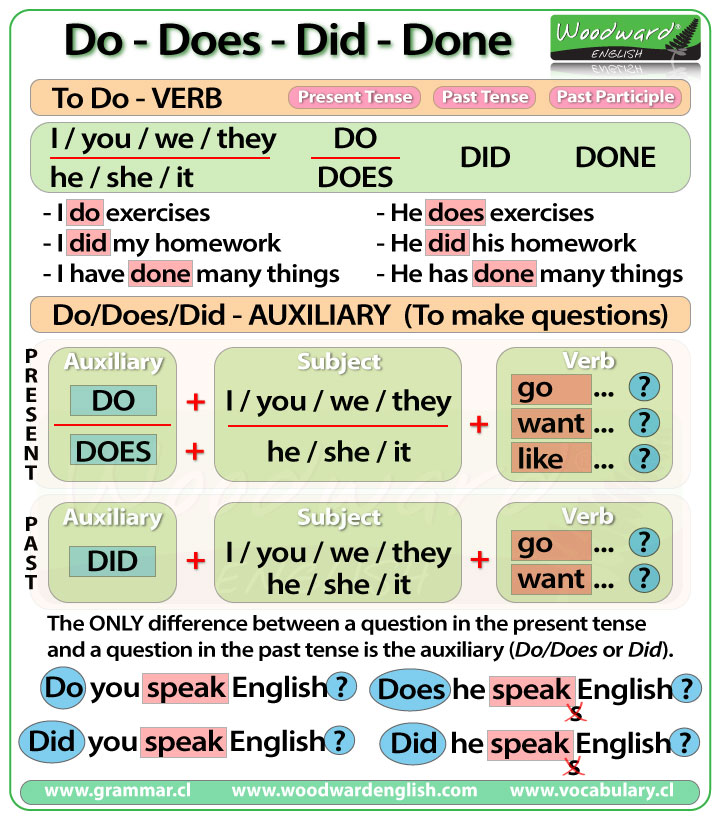
- 980k Followers
- 217k Followers
- 126k Followers
English Course
Perfect tense.
- Present Perfect Tense in English
- When to use the Present Perfect Tense
- Adverbs with the Present Perfect Tense
- Still - Yet - Already
- Been To vs. Gone To
- Do - Does - Did - Done
- 101 Irregular Past Participles in English
Pin It on Pinterest
Yale Grammatical Diversity Project English in North America
Done my homework.
(Yerastov 2010b:117)
The done my homework construction involves a form of the word be , followed by the participle finished or done (or, for some speakers, started ), followed by a noun phrase. (1) and (2) show two examples of this construction:
1) I’m done my homework. 2) I’m finished my homework.
Note that the noun phrase does not have to be my homework . In fact, it can be almost any noun phrase, as shown by the following examples taken from Hinnell (2012:4):
3) a. Martin is done his bass tracks and we are ready to start vocals. b. By the time I am done dinner , I don’t want my side snack. c. So many bloggers I read are doing this. One is already done her 50,000 words ! d. This will be particularly important once you’re done the tattoo and need to leave the shop.
Who says this? Syntactic properties Recent survey results References
.jpg)
Who says this?
The done my homework construction is a widespread characteristic of Canadian English, and it is also found in the United States among speakers in the Philadelphia area, southern New Jersey, Delaware, Maryland and the northern part of New England (Yerastov 2008, 2010a, 2010b, 2012, 2016; Hinnell 2012; Fruehwald and Myler 2013, 2015; Zanuttini et al. 2016). It has not been found in the dialects of the United Kingdom or elsewhere outside of North America.
See our interactive maps below to explore some of the raw data in more detail.
Syntactic Properties
The syntax of this construction has recently been studied in some detail by Fruehwald and Myler (2013, 2015). The following description is based on their work.
Degree modification by all
The done my homework construction may seem to resemble a sentence like I have done my homework . (A sentence that, like this one, contains have plus a participle is said to be in the perfect aspect ). However, the phrase done my homework is actually more similar to adjective phrases such as ready for school because, like an adjective phrase, these phrases can be modified by the degree word all . (4a) shows a typical example of all modifying an adjective phrase (namely, ready for school ), and (4b) shows an analogous example of the done my homework construction with modification by all :
4) a. I’m all ready for school. b. I’m all done my homework.
By contrast, done my homework may not be modified by all when it is used in a sentence with the perfect aspect. Thus, (5) is not acceptable:
5) *I have all done my homework.
This is evidence that the done my homework construction is not an instance of a verb phrase in the perfect aspect but rather is more like an adjective phrase.
Co-occurrence with perfect aspect
The done my homework construction also differs from verb phrases in the perfect aspect in that done my homework can actually co-occur with the perfect aspect, as in (6):
6) I have been done my homework for a while now.

By contrast, although done my homework can co-occur with the perfect aspect as shown in (6), the perfect aspect cannot co-occur with a second instance of the perfect aspect in the same sentence. Thus, (7) would not be acceptable:
7) *I have had done my homework for a while now.
Fruehwald and Myler (2013, 2015) show several other ways in which the done my homework construction is distinct from the perfect aspect.
No leaving the object behind
At first glance, it may be tempting to think that the done my homework construction involves simply not pronouncing the word with in a sentence like (8):
8) I'm done with my homework.
Fruehwald and Myler (2013, 2015), however, present several differences between the two constructions. One such difference is the ability (shown in (9c)) to move the word done to the beginning of the sentence, similar to the movement of proud and angry in (9a) and (9b):
9) a. Proud though John is of his daughter , it won't matter. b. Angry though John is with his daughter , it won't matter. c. Done though John is with his computer , it won't matter.
This kind of movement is not possible with the done my homework construction. For example, although the entire phrase done his homework may be moved as in (10b), (10a) would be judged unacceptable because only done has moved, leaving the object his homework behind:
10) a. * Done though John may be his homework , it won't matter. b. * Done his homework though John may be, it won't matter.
In this respect, it is similar to phrases like worth the money because (11a), like (10a), is unacceptable, whereas (11b), like (10b), is acceptable:
11) a. * Worth though this may be the money , it won't matter. b. * Worth the money though this may be, it won't matter.
Fruehwald and Myler (2013, 2015) also argue that the meaning of the construction is not what we would expect if it involved an unpronounced with .
Allowed verbs
There is variation across dialects in terms of which verbs speakers allow in this construction. According to Yerastov (e.g. 2010a, 2010b), there is a hierarchy along the lines of finished > done > started . In other words, if speakers accept started (as in I'm started my homework ), they will accept all three verbs. If speakers accept done , they will also accept finished , but not necessarily started . Finally, some speakers accept only finished . This kind of hierarchy resembles the one found in the needs washed construction with need > want > like (see here for further discussion of the needs washed construction).
Recent Survey Results
The following map shows results from a recent nationwide survey. It represents speakers' judgments of the sentence I'm done my homework . There is some description of the map on the left, as well as a legend in the upper righthand side.
This next map shows recent results of a survey regarding various iterations of the PAST-PARTICIPLE + YOUR HOMEWORK construction:
Page contributed by Jim Wood on February 28, 2014.
Updates/revisions: August 9, 2015 (Tom McCoy); June 1, 2018 (Katie Martin); July 8, 2020 (Oliver Shoulson)
Please cite this page as: Wood, Jim. 2014. Done my homework. Yale Grammatical Diversity Project: English in North America . (Available online at http://ygdp.yale.edu/phenomena/done-my-homework . Accessed on YYYY-MM-DD). Updated by Tom McCoy (2015), Katie Martin (2018), and Oliver Shoulson (2020).
- Rules/Help/FAQ Help/FAQ
- Members Current visitors
- Interface Language
Follow along with the video below to see how to install our site as a web app on your home screen.
Note: This feature may not be available in some browsers.
- English Only
I have my homework done.
- Thread starter jinkyeong park
- Start date Oct 22, 2020
jinkyeong park
Senior member.
- Oct 22, 2020
Hey~ I have a question about causative verb. When you say "get something done " structure sentence, that means you had someone do something for you. but what about this sentence, " I have my homework done." in this sentence you didn`t get anyone to do your homework for you. but why do you say like that? ^^ can anyone explain how it is so?
Florentia52
Modwoman in the attic.
"I have my homework done" sounds as though you arrange for someone to do your homework for you. Is that what you meant?
jinkyeong park said: but why do you say like that? Click to expand...
heypresto said: Who says it like that? The normal way to say it is 'I have done my homework.' Click to expand...
Mód ar líne
jinkyeong park said: I got my homework done..., . Is it strange to say that??? Click to expand...
You could say 'I got my homework done, and then . . . played a game/watched TV/took the dog for a walk/had dinner etc '. In other words, it sounds OK if it's part of a sort of list of things you did. But on its own, it doesn't sound as natural as the alternatives we've offered you. But these are all different from the 'I have my homework done' you first asked about.
Florentia52 said: "I have my homework done" sounds as though you arrange for someone to do your homework for you. Is that what you meant? Click to expand...
heypresto said: You could say 'I got my homework done, and then . . . played a game/watched TV/took the dog for a walk/had dinner etc '. In other words, it sounds OK if it's part of a sort of list of things you did. But on it's own, it doesn't sound as natural as the alternatives we've offered you. But these are all different from the 'I have my homework done' you first asked about. Click to expand...
You might be able to say "I have my homework done" to mean "I've finished by homework" if you framed it in a very specific context. It's certainly not how we'd normally say it. An AE speaker could say "I got my homework done" -- again, in the right context -- without following it with a list of other activities.
jinkyeong park said: I watched youtube channel, and there someone(I don't remember who that was though) I finished my homework or I did my homework doesn`t sound native like, and said to say I got my homework done..., . Is it strange to say that??? Click to expand...
jinkyeong park said: really ???? so please let me make sure if understand clearly. 1.you can never say "I have my homework done" unless you really had someone do it. 2.You can never say " I got my homework done" itself unless it is followed by more things you did. and I wonder is there any grammatical reason why Nr2 is right? or it just became accepted with no reason?? Click to expand...
rodoke said: Not the person you were replying to, but I would say no/false to both. For question one, "I have my homework done" can mean either one. In speech, you couldn't confuse them; native speakers would use different intonation and stress. In writing, you can easily rely on context. For question two, "I got my homework done" doesn't require anything, but people generally use it with an adverb or prepositional phrase like "quickly", "yesterday", or "on the bus". By itself, it's just a less formal version of "I have my homework done". Personally, I would prefer "my homework is done". Click to expand...
<Threads have been merged at this point by moderator (Florentia52)> I found this sentence on internet. Jared: "Hey Jew Fro , did you get your homework done ?" can I say"I got my homework done"?
Yes. That sentence is normal. It means the same as "I finished doing my homework."
dojibear said: Yes. That sentence is normal. It means the same as "I finished doing my homework." Click to expand...
"Get" has several different meanings. See the homework sentence in meaning 3 below. The "someone else" meaning is meaning 2. 1. One meaning is "become": Bobby gets fat. (Bobby becomes fat). 2. Sometimes we use "causative" verbs to mean "cause someone else to do it for you". We can use "have", " get ", "make", "ask" etc. She had Bobby drive her car. She got Bobby to drive her car. She made Bobby drive her car. She asked Bobby to drive her car. 3. Sometimes "get" means "cause to become". Bobby got the car into the garage. I got my homework done. I finally got the fire burning. 4. Sometimes "get" means "bring; fetch": Bobby, get the milk from the fridge. 5. Sometimes "get" means "understand a joke": I didn't get it. What do you mean?
Maria Fimbres
jinkyeong park said: Hey~ I have a question about causative verb. When you say "get something done " structure sentence, that means you had someone do something for you. but what about this sentence, " I have my homework done." in this sentence you didn`t get anyone to do your homework for you. but why do you say like that? ^^ can anyone explain how it is so? Click to expand...
You little ripper!
There are certain contexts where I have my homework done could work for me. I have my homework done, the bedroom’s tidy, I’ve taken out the garbage, I can now sit down in front of TV and relax!
You little ripper! said: There are certain contexts where I have my homework done could work for me. I have my homework done, the bedroom’s tidy, I’ve taken out the garbage, I can now sit down in front of TV and relax! Click to expand...
jinkyeong park said: I don't think I will never understand why you use " I have my homework done" only when it is followed by a list of things you did after that.. TTT I guess there is no grammar rule either. I am now really curious why native use that sentence only in that case ^^ but thanks you I might just have to accept it as it is ^^^ Thanks you I will use the sentence only in the case you said you use. Click to expand...
- Oct 23, 2020
Uncle Jack said: I don't think I would use three different constructions all together like this. Click to expand...
"I have my homework done." is a common construct in Hiberno-English and means that I have done my homework (myself).
Stack Exchange Network
Stack Exchange network consists of 183 Q&A communities including Stack Overflow , the largest, most trusted online community for developers to learn, share their knowledge, and build their careers.
Q&A for work
Connect and share knowledge within a single location that is structured and easy to search.
Which timeline illustrates “I have finished my homework” most accurately? [duplicate]

I have learned Present-perfect in school. But I felt that foreigner used in different way of Present-perfect. What is the right tense of this sentence?
Please choose the right picture that shows the exact meaning of the sentence i.e. I have finished my homework . Is it No.1 or No.2?
I heard that the Present-perfect tells the nearest past. The blue part of the picture shows the tense of the sentence. I think No.2 is the right picture that shows the right meaning of the sentence (I have finished my homework.) The sentence below include the nearest past of Present perfect tense. Am I right?
- present-perfect
- perfect-aspect
- related: 1. How to correctly use the present perfect tense 2. Simple Past vs. Present Perfect: “was” vs. “has been” 3. Past simple vs present perfect – Mari-Lou A Commented Sep 22, 2015 at 9:38
Neither is right or wrong. That is not the distinction which the present perfect captures.
I have finished my homework.
is stating that the event in the past has some present relevance . Sometimes the present relevance is that it is very recent (your picture 2); but other times it will have a different significance.
For example,
Do you want to go out? No, I've got my homework to do. That's a pity: I've finished my homework, and I want to do something.
doesn't necessarily mean that I have just now finished my homework: I might have, but it might be that I finished it this morning. The present relevance is that now I am in a state of having-finished-my-homework, whereas you are not in that state.
In fact the significance of aspect (in English, perfect vs. past, or continuous vs. not continuous) is often not in the events described, but in the way you are, at that moment, choosing to talk about the events.
- I've been looking at the OP's timeline graph and it's not that bad really. But I'd say that neither one of them is right or wrong. Funnily enough, if you compare the OP's graph with the proposed duplicate question, the first is very similar to Robusto's graphical representation. english.stackexchange.com/a/21847/44619 – Mari-Lou A Commented Sep 22, 2015 at 12:33
Not the answer you're looking for? Browse other questions tagged meaning present-perfect perfect-aspect or ask your own question .
- Featured on Meta
- Join Stack Overflow’s CEO and me for the first Stack IRL Community Event in...
- User activation: Learnings and opportunities
Hot Network Questions
- How much would you trust a pre-sales inspection from a "captured" mechanic?
- What is all this —?
- The result clause of first conditional possesses would instead of will
- Nginx rewrite directive loops, location with trailing slash doesn't match, why?
- Sync Layernotes between Projects
- How am I supposed to solder this tiny component with pads UNDER it?
- How to avoid repeated input while using newcommand?
- Calm and Insight is the Normative Meditative Practice in Buddhism
- How can "chemical-free" surface cleaners work?
- Is SQL .bak file compressed without explicitly stating to compress?
- Was the total glaciation of the world, a.k.a. snowball earth, due to Bok space clouds?
- If a mount provokes opportunity attacks, can its rider be targeted?
- Returning to the US for 2 weeks after a short stay around 6 months prior with an ESTA but a poor entry interview - worried about visiting again
- Why does Item Response Theory not depend on a representative sample, or why is it "sample-independent"?
- Smoking on a hotel room's balcony in Greece
- Can this phrase "the Conservatives opposite" be regarded as apposition structure?
- My one-liner 'delete old files' command finds the right files but will not delete them
- When did St Peter receive the Keys of Heaven?
- Would a material that could absorb 99.5% of light be able to protect someone from Night Vision?
- How to interpret odds ratio for variables that range from 0 to 1
- How to win a teaching award?
- Wondering about ancient methods of estimating the relative planetary distances
- Cutting a curve through a thick timber without waste
- meaning of a sentence from Agatha Christie (Murder of Roger Ackroyd)

National Politics | Now a Roe advocate, woman raped by stepfather…
Share this:.
- Click to share on Facebook (Opens in new window)
- Click to share on X (Opens in new window)
Daily e-Edition
Evening e-Edition
- Latest Headlines
- Environment
- Crime and Public Safety
- Transportation
Breaking News
National politics | state rep. amesty pleads not guilty to felony charges, national politics, national politics | now a roe advocate, woman raped by stepfather as a child tells her story in harris campaign ad.

WASHINGTON (AP) — A 22-year-old woman who became an abortion rights advocate after she was raped by her stepfather as a child tells her story in a new campaign ad for Democratic presidential nominee Kamala Harris.
Hadley Duvall says in voiceover that she’s never slept a full night in her life — her stepfather first started abusing her when she was five years old, and impregnated her when she was 12. As she speaks, images of Duvall as a child flash on the screen. The soundtrack of the ad is a song by Billie Eilish, who endorsed the vice president on Tuesday.
“I just remember thinking I have to get out of my skin. I can’t be me right now. Like, this can’t be it,” Duvall says. “I didn’t know what to do. I was a child. I didn’t know what it meant to be pregnant, at all. But I had options.”
The ad is part of a continued push by the Harris campaign to highlight the growing consequences of the fall of Roe, including that some states have abortion restrictions with no exceptions for rape or incest. Women in some states are suffering increasingly perilous medical care and the first reported instance of a woman dying from delayed reproductive care surfaced this week. Harris lays the blame squarely on Republican nominee Donald Trump, who appointed three of the conservatives to the U.S. Supreme Court who helped overturn the constitutional right to abortion .
Duvall blames Trump, too.
“Because Donald Trump overturned Roe v. Wade, girls and women all over the country have lost the right to choose, even for rape or incest,” she says in the ad. “Donald Trump did this. He took away our freedom.”

During the presidential debate on Sept. 10, Trump repeatedly took credit for appointing the three Supreme Court justices and leaned heavily on his catchall response to questions on abortion rights, saying the issue should be left up to the states. He said he would not sign a national abortion ban.
“I’m not signing a ban,” he said, adding that “there is no reason to sign the ban.”
But he also repeatedly declined to say whether he would veto such a ban if he were elected again — a question that has lingered as the Republican nominee has shifted his stances on the crucial election issue.
Duvall of Owensboro, Kentucky, first told her story publicly last fall in a campaign ad for the governor’s race in her home state supporting Democratic Gov. Andy Beshear. Duvall’s stepfather was convicted of rape and is in prison; she miscarried.
Beshear won reelection , and Democrats have said Duvall’s ad was a strong motivator, particularly for rural, male voters who had previously voted for Trump.
Duvall is also touring the country to campaign for Harris along with other women who have been telling their personal stories since the fall of Roe, joining Pennsylvania Gov. Josh Shapiro last week.
- Contact Us at the Orlando Sentinel
- Send a News Tip to the Orlando Sentinel
More in National Politics

National Politics | Iranian hackers tried but failed to interest Biden’s campaign in stolen Trump info, FBI says

National Politics | Teamsters union declines to endorse Trump or Harris for president

National Politics | Swing-state TV viewership surged for the Trump-Harris debate

SUBSCRIBER ONLY
National politics | swing-state court fights flare over voting rules before election.
Stack Exchange Network
Stack Exchange network consists of 183 Q&A communities including Stack Overflow , the largest, most trusted online community for developers to learn, share their knowledge, and build their careers.
Q&A for work
Connect and share knowledge within a single location that is structured and easy to search.
Is "I am done doing my homework" grammatical?
I am done doing my homework
This sounds odd to me and I don't understand what "doing my homework" is in this sentence.
I don't understand how the phrase "I am done" (I assume "done is an adjective here, passive voice doesn't make sense to me) can be followed by this -ing phrase. Sentences like "I finished doing my homework." are easily understood and the gerund could be replaced with a noun ("I finished my homework.") This is a different kind of construction of course. But instead of "to be done doing" I would say "I have done my work" or if I want to keep the "doing" maybe "I am done with doing my homework." Otherwise I find it unintelligible.
Also similar constructions use prepositions too for example "I am tired of being alone" "I am fed up with being single" this one does not.
- sentence-construction
- phrasal-verbs
3 Answers 3
It's idiomatic. Either of these two forms are commonly used:
Jimmy, what are you up to? I'm doing my homework. mom. ... Mom, I'm done doing my homework!
Mom, I'm done with my homework!
In the first case, "doing my homework" is the task. In the second case, "homework" is the task. It depends on whether you regard 'homework' as a concrete noun - a collection of papers to be worked with in some way - or as an abstract noun - an assignment to be accomplished.
Done and doing close together might be confusing, but each has a grammatical role in this sentence.
Done to express completion
I am done verb -ing
As you wrote, done here is an adjective indicating the completion of an activity. You appear to understand this already, so I won't spend too much time explaining its meaning, but in terms of grammar the key is that done can take a following -ing clause as a complement.
Do as a light verb
doing my homework
In this clause, we have the light verb do , which adds very little meaning of its own. Instead, the bulk of the meaning comes from the noun homework (which is semantically "heavy").
In English, we sometimes use light verbs with nouns like homework because they have no verb form: *homeworking is not an established English verb, so it's not an option. There are other times when both light ( take a shower ) and heavy verbs are possible ( shower ), but this is not one of them.
This is an -ing clause, so the adjective done can take it as a complement. (These are called gerund-participial clauses by Huddleston and Pullum; they do not distinguish gerund clauses from participle clauses, and we don't need to do so here either.)
Put them together, and you get your sentence:
I'm done doing my homework.
Doing my homework is the activity, and done expresses completion of that activity, taking doing my homework as a complement. It may be confusing to you at first to hear two different forms of do next to each other, but each has its place, and this is a perfectly natural English sentence.
"I'm done," or "I'm finished," means that you are completely exhausted, spent, and no longer able to continue in the task at hand.
Finally! I'm done with that.
You must log in to answer this question.
Not the answer you're looking for browse other questions tagged sentence-construction phrasal-verbs gerunds ..
- Featured on Meta
- User activation: Learnings and opportunities
- Join Stack Overflow’s CEO and me for the first Stack IRL Community Event in...
Hot Network Questions
- Returning to the US for 2 weeks after a short stay around 6 months prior with an ESTA but a poor entry interview - worried about visiting again
- What are some limitations of this learning method?
- Using a Compass to Detect Islands in the Sky
- In The Martian, what does Mitch mean when he is talking to Teddy and says that the space program is not bigger than one person?
- How to add Z-axis to analog oscilloscope?
- Inequalities and GIF
- Invariance of the Lebesgue measure
- Disable Firefox feature to choose its own DNS
- I'm just starting grad school and I'm already finding baby rudin's exercises too hard
- How to avoid repeated input while using newcommand?
- Is this legal to help a friend in need
- Why did mire/bog skis fall out of use?
- Fear of getting injured in Judo
- Calm and Insight is the Normative Meditative Practice in Buddhism
- 3D Chip Design using TikZ
- My one-liner 'delete old files' command finds the right files but will not delete them
- Why believe in the existence of large cardinals rather than just their consistency?
- What is all this —?
- What's the origin and first meanings of the term "grand piano"?
- How would you say "must" as in "Pet rabbits must be constantly looking for a way to escape."?
- How to plausibly delay the creation of the telescope
- How to translate the letter Q to Japanese?
- How is AC and DC defined?
- Can noun phrases have only one word?

IMAGES
VIDEO
COMMENTS
After you finish your homework, call me. After you have finshed your homework, call me. I pretty often hear natives use after and the present perfect when referring to the future, but I am not aware of the difference between the present simple and perfect when talking about the future. grammar; tense; present-perfect;
14. Have done --- Have done is a present perfect tense, generally it is used when the action is completed recently/just now. Had done -- Had done is a past perfect tense, generally refers to something which happened earlier in the past, before another action also occured in the past. For Example:
The main difference between "had done" and "have done" lies in the time they refer to. "Had done" is used in the past perfect tense. It talks about actions completed before another action or time in the past. For example, "She had done her homework before she went to the movies.". This means she finished her homework at some ...
The word 'having' in this sentence means that I have done my homework, therefore I can carry out the specified action (go home). Having done/Having finished is an example of a perfect participle , indicating you have completed the past action, and can carry out the second action.
Just. Present Perfect is also used to talk about something recently finished. I have just done my homework: This means not so long ago you finished your homework. It is an unspecified time in the past. We don't know when the person did it, but it wasn't so long ago. It is usually used to stress that you finished the action and there it no ...
The present perfect tense is used to describe something that happened in the past, but the exact time it happened is not important. It has a relationship with the present. I have done my homework = I finished my homework in the past. It is not important at what exact time, only that it is now done.
The present perfect expresses the idea of "an action that was finished at some unspecified point in the past". Saying "I have done it yesterday" is basically the same as saying "I finished doing it yesterday at some unspecified point in the past". It doesn't really work, does it; it's ei ...
1. The New Yorker. "I've done my homework on this. 2. The New York Times. "I thought I had done my homework," Grace told him. 3. The New Yorker. I had done my homework and thought it all out, or so I thought.
I've lost my keys. We've been to a very nice restaurant. We use the past simple (NOT present perfect) when we mention or ask about when something happened or when the time is known by the speaker and the listener. We often use a past expression (last week, yesterday, when I was a child, etc.) We've arrived yesterday.
Exercises: 1 2 3. When I do vs When I have done. Exercise 1. Choose the correct verb forms to complete the sentences below. Use the PRESENT PERFECT when possible. 1 I'll ask Tony about it when I him. 2 The kids will have their snack while they their homework. 3 You won't get a pay rise until you here for at least a year.
'I am done (with my work)' is a straggler from older English. In Old English, the present perfect was formed somewhat differently. Whereas Modern English uses to have in almost every construction, be it transitive or intransitive, older English used to have with transitive verbs and to be with intransitive verbs. Here are some intransitive examples:
"Have Done" is a bit simpler than "Had Done", because it can express one stand-alone action, without the need to think about what happened before or after. "Have Done" is the present perfect of the verb "Do" and should be used to indicate an action was just recently finished. Take a look at the sentences in the examples, that ...
After being called to the principal's office, I was disciplined for my behavior. After being put on probation, he had to follow a strict set of rules. After having done my homework, I watched TV. After being used for many years, the car was finally replaced. After being fired from his job, he had to find a new way to make a living.
Again, it doesn't necessarily mean you finished all your homework, although it is more finalising that "I did my homework." "I have done my homework" means, like the first three, that you have finished it. Share. Improve this answer. Follow answered Nov 28, 2016 at 6:53. minseong ...
Download Article. 1. Ask your parents or peers for help. Parent involvement in homework has been shown to help with homework completion and improved academic performance. [15] Asking a friend for help in understanding a concept or an assignment can go a long way in helping you complete your homework on time. [16] 2.
In general Have + past participle is used with a perfect tense and BE + past participle is with the passive voice. Let's look at some examples: I have done my homework. He has done a good job. These two sentences are in the present perfect tense because they have have or has before the past participle done. The video will show you how it is done.
Similarly, mastering the use of "done" in affirmative and negative statements is crucial in expressing perfect tenses. When used correctly, "done" emphasizes the completion of an action and its ongoing relevance to the present moment. Examples of such statements include "I have done my homework" and "He has not done a good job."
A) After I eat something, I will go shopping. B) After I have eaten something, I will go shopping. C) When I do my homework, I will go shopping. D) When I have done my homework, I will go shopping. <-----Additional sentences removed by moderator (Florentia52)----->. If they are all correct what is the difference between (A) and (B)- (C) and (D ...
The done my homework construction involves a form of the word be, followed by the participle finished or done (or, for some speakers, started), followed by a noun phrase.(1) and (2) show two examples of this construction: 1) I'm done my homework. 2) I'm finished my homework. Note that the noun phrase does not have to be my homework.In fact, it can be almost any noun phrase, as shown by the ...
But these are all different from the 'I have my homework done' you first asked about. so please let me make sure if understand clearly. 1.you can never say "I have my homework done" unless you really had someone do it. 2.You can never say " I got my homework done" itself unless it is followed by more things you did.
Why the sentence you tried doesn't work. Now let's discuss why. [1] I have done it before today. doesn't work in your case. It is an acceptable sentence of English, but it is probably not how that conversation would actually go. In your context, it sounds awkward. To explain why, let's consider the following sentence:
Neither is right or wrong. That is not the distinction which the present perfect captures. I have finished my homework. is stating that the event in the past has some present relevance.Sometimes the present relevance is that it is very recent (your picture 2); but other times it will have a different significance.
A 22-year-old woman who became an abortion rights advocate after she was raped by her stepfather as a child tells her story in a new campaign ad for Democratic presidential nominee Kamala Harris.
Mom, I'm done doing my homework! or. Mom, I'm done with my homework! In the first case, "doing my homework" is the task. In the second case, "homework" is the task. It depends on whether you regard 'homework' as a concrete noun - a collection of papers to be worked with in some way - or as an abstract noun - an assignment to be accomplished.